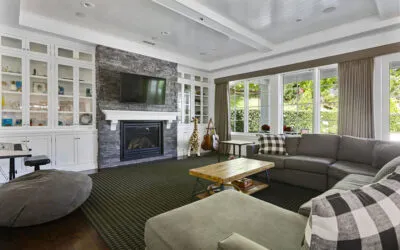Residential treatment can be life-changing for a teen struggling with mental health, trauma, or behavioral challenges. But what happens after your child returns home? The transition back to daily life is a critical period — one that requires patience, structure, and...
Recent Posts
How Residential Treatment Supports Teens with Co-Occurring Disorders
Navigating adolescence is challenging enough, but for teens grappling with co-occurring disorders, the journey can feel insurmountable. Co-occurring disorders, also known as dual diagnoses, refer to the presence of two health disorders occurring at the same time....
A Parent’s Guide To Navigating Grief In Teenagers
Grief is a complex emotion that can be challenging for teens to navigate. According to the Childhood Bereavement Estimation Model (CBEM), 1 in 12 children and teens in the U.S. will experience the death of a parent or sibling by age 18. While grief is usually...
How Long Is Residential Treatment for Teens?
If your child is about to begin a stay at a residential treatment center, you’re bound to have a lot of questions. What types of therapy will be involved? Will our family be allowed to visit? And, of course, how long is a teen residential treatment program? In this...
Is Residential Treatment Considered Inpatient or Outpatient?
If you’ve never engaged with residential treatment centers before, it’s common to ask: is residential treatment considered inpatient or outpatient? Well, the answer is simple: our residential teen treatment centers are considered inpatient because teens stay at our...
Benefits of Residential Treatment for Teens: When to Choose It Over Other Treatment Programs
When seeking help for your teen, it’s important to know the benefits of residential treatment teens can take advantage of. For teens suffering from mental health disorders, behavioral disorders, psychological disorders, or addiction issues, there are a variety of...
Does Insurance Cover Teen Residential Treatment?
How Much Does Residential Treatment Cost? Cost of Residential Treatment The cost of residential treatment varies between each Residential Treatment Center (RTC). It may range from free (which is very uncommon) to tens of thousands of dollars per month. And if you are...
3% of Teens Identify as Transgender or Gender Nonconforming in America
How Many Transgender Teens Are There? Approximately 150,000 American teens (ages 13 to 17) identify as transgender in the United States today. Of course, there is no general age in which people typically “discover” or “come out” as transgender. Nonetheless, more and...
Recognizing Signs of Teen Depression: A Guide for Parents
It is very common for children and adolescents to experience occasional moodiness or periods of sadness. The causes of teen depression are multifaceted, involving biological, environmental, and social factors such as bullying, mental health conditions, stressful life...
Distinguishing Between Signs of Depression or “Moodiness” in Teens
Parents often wonder how to distinguish normal teenage mood swings and rebellions from actual symptoms of depression. Fortunately, there are several ways to tell. As many as 1 in 5 teenagers will experience depression at some point during adolescence. Unfortunately,...
Social Anxiety Disorder in Teens: Signs, Symptoms, and How to Help
What is Social Anxiety Disorder? Social anxiety disorder (SAD) affects 1 out of 3 adolescents between 13 and 18 years old. Over 19 million people across America suffer from social anxiety disorder (SAD) today, including a significant number of young adults. It is...
Teen Depression Prevention: Parent, Friend, and Support Tips
At any given time, one out of every five teenagers is experiencing major depression. If you are a parent to an adolescent or teenager, you are likely familiar with the moodiness inherent to this age group. Mood swings are common, as teens are experiencing a vast...
How to Talk to Your Teen About Depression
Teen depression is more common — and more serious — than many parents realize. While emotional ups and downs are a normal part of adolescence, persistent sadness, irritability, or withdrawal may point to something deeper. Knowing how to talk to your teenager about...
Managing Expectations With Teens
As a parent of an adolescent, teen, or young adult, your attitudes, actions, and beliefs can have a tremendous impact on your child’s well-being. Your teen is experiencing the challenging process of transitioning from childhood to adulthood. As someone who has gone...
How to Know If Your Child Is Transgender
There is no simple test to tell if a child is transgender. Experts often refer to the idea of insistence, consistency, and persistence in terms of gauging whether a child is just going through a phase or not. This means the more insistent a child is and the longer...
How Behavioral Residential Treatment Helps Teens Build Long-Term Skills

Adolescence is a critical time of growth, self-discovery, and, unfortunately, significant challenges. Some teens struggle with behavioral issues, emotional regulation, mental health disorders, and unhealthy coping mechanisms that interfere with their daily lives. When traditional outpatient therapy isn’t enough, behavioral residential treatment can provide the structure and support needed to foster lasting change.
Behavioral residential treatment isn’t just about addressing immediate concerns — it’s about equipping teens with the tools they need for long-term success. By focusing on emotional regulation, healthy communication, decision-making, and self-confidence, these programs provide teens with the skills they need to thrive well beyond their time in treatment.
What Is Behavioral Residential Treatment?
Behavioral residential treatment is an intensive, live-in therapy program designed to help teens who struggle with emotional, psychological, or behavioral challenges. These centers provide a structured and supportive environment where teens receive professional care, therapy, and skill-building interventions to address issues such as:
- Anxiety and depression
- Trauma and PTSD
- Substance use disorders
- Self-harm and suicidal ideation
- Eating disorders
- Oppositional defiant disorder (ODD)
- Autism spectrum disorder (ASD)
- Attention deficit hyperactivity disorder (ADHD)
Unlike traditional outpatient therapy, where teens meet with a therapist once or twice a week, residential treatment offers 24/7 support and a comprehensive approach that includes individual therapy, group therapy, experiential learning, and skill-building activities.
How Residential Treatment Helps Build Long-Term Skills
A key benefit of behavioral residential treatment is that it goes beyond symptom management to help teens develop essential life skills that they can carry into adulthood. The length of residential treatment can vary but generally consists of building lasting tools that teens can carry forward into their lives. Below are some of the most critical skills these programs help develop.
1. Emotional Regulation
Many teens struggle to regulate their emotions, leading to outbursts, self-harm, or other destructive behaviors. Residential treatment provides a structured environment where teens learn:
- Mindfulness techniques to recognize and process emotions
- Coping strategies for stress, anxiety, and frustration
- Cognitive behavioral therapy (CBT) and dialectical behavioral therapy (DBT) to challenge negative thought patterns
- Emotional intelligence skills to understand and manage feelings effectively
By practicing these techniques daily in a supportive setting, teens build resilience and develop healthier responses to stressors.
2. Healthy Communication Skills
Poor communication can lead to misunderstandings, frustration, and conflict. Many teens in residential treatment struggle with expressing their thoughts and emotions in a productive way. Treatment programs teach:
- Active listening and empathy
- Assertive (not aggressive or passive) communication
- Conflict resolution strategies
- How to establish and maintain healthy relationships
These skills help teens navigate friendships, family relationships, and future workplace interactions with confidence and clarity.
3. Decision-Making and Problem-Solving
Impulsivity and poor decision-making are common among teens with behavioral challenges. Residential treatment helps teens build better decision-making skills by:
- Teaching them to analyze situations before reacting
- Encouraging critical thinking and problem-solving techniques
- Providing real-world scenarios where they can practice making positive choices
- Helping them set personal goals and work toward achieving them
Through structured activities and therapy, teens learn to pause, reflect, and make choices that align with their long-term well-being.
4. Self-Discipline and Accountability
Many teens in treatment struggle with self-discipline and taking responsibility for their actions. Residential programs encourage accountability by:
- Setting clear rules and expectations
- Implementing structured routines that promote consistency
- Encouraging natural consequences for behaviors (positive reinforcement for good behavior, appropriate consequences for negative behavior)
- Helping teens set personal goals and track progress
By learning accountability in a structured setting, teens develop a sense of responsibility that translates into better decision-making in their daily lives.
5. Coping Strategies for Stress and Triggers
Teens who struggle with mental health challenges often turn to unhealthy coping mechanisms such as substance use, self-harm, or avoidance. Behavioral residential treatment introduces and reinforces healthier coping strategies, such as:
- Deep breathing exercises and guided meditation
- Journaling and expressive writing
- Physical activity and movement therapy
- Engaging in creative outlets such as art, music, or drama therapy, helping build lasting hobbies that can serve as positive outlets for stress relief
By practicing these strategies daily, teens build a toolkit of healthy coping mechanisms they can rely on in the future.
6. Developing Healthy Routines and Independence
Structure and routine are essential for mental well-being. Residential programs provide a consistent daily schedule that includes:
- Regular wake-up and bedtimes
- Set meal times and nutrition education
- Exercise and recreational activities
- Designated therapy sessions and personal development activities
This structured environment helps teens establish healthy habits that they can carry into their everyday lives after treatment.
7. Building Confidence and Self-Esteem
Low self-esteem is a common issue among teens with behavioral and mental health challenges. Residential treatment programs help teens build confidence by:
- Providing a supportive, judgment-free environment
- Encouraging self-reflection and self-acceptance
- Helping them recognize and celebrate their strengths
- Setting achievable goals and acknowledging progress
When teens develop a positive self-image, they become more motivated to make healthy choices and engage in fulfilling activities.
8. Developing Social Skills and Peer Support
Teens in residential treatment often feel isolated or struggle to connect with peers. These programs emphasize group therapy and social skill-building activities that help teens:
- Develop healthy friendships
- Learn teamwork and collaboration
- Gain perspective and support from others facing similar struggles
- Practice social interactions in a structured, supportive environment
The peer connections formed in treatment can help teens feel understood and less alone in their challenges.
The Lasting Impact of Residential Treatment
Behavioral residential treatment isn’t just about short-term stabilization — it’s about long-term success. Many teens who complete residential programs experience lasting improvements in their mental health, relationships, and overall well-being. With better emotional regulation, communication skills, and coping mechanisms, they are more equipped to navigate life’s challenges with confidence.
For many, this leads to improved academic performance, stronger family relationships, and a greater sense of independence. Teens who once struggled with anxiety, depression, or impulsive behaviors often find themselves better prepared for school, work, and social interactions. By reinforcing positive habits and encouraging self-awareness, residential treatment helps teens take ownership of their progress, leading to healthier choices and greater resilience in the years ahead.
Is Residential Treatment Right for Your Teen?
If your teen is struggling with emotional, behavioral, or mental health challenges that impact their daily life, residential treatment may be the next step. At Polaris Teen Center, we specialize in helping teens build the skills they need to thrive. Our compassionate team provides evidence-based therapies, structured routines, and individualized care to support long-term success.
Contact Polaris Teen Center today to learn more about how our behavioral residential treatment programs can help your teen build a healthier, brighter future.
Polaris Teen Center is a residential treatment facility for teens and adolescents suffering from severe mental health disorders. Our highly accredited facility is fully licensed and certified in Trauma Informed Care and is a part of the Behavioral Health Association of Providers (formerly AATA).
Previous Post
Next Post
Related Posts
After Residential Treatment: Helping Teens Transition Back Home
Residential treatment can be life-changing for a teen struggling with mental health, trauma, or behavioral challenges. But what happens after your child returns home? The transition back to daily life is a critical period — one that requires patience, structure, and...
How Residential Treatment Supports Teens with Co-Occurring Disorders
Navigating adolescence is challenging enough, but for teens grappling with co-occurring disorders, the journey can feel insurmountable. Co-occurring disorders, also known as dual diagnoses, refer to the presence of two health disorders occurring at the same time....
How Long Is Residential Treatment for Teens?
If your child is about to begin a stay at a residential treatment center, you’re bound to have a lot of questions. What types of therapy will be involved? Will our family be allowed to visit? And, of course, how long is a teen residential treatment program? In this...
Is Residential Treatment Considered Inpatient or Outpatient?
If you’ve never engaged with residential treatment centers before, it’s common to ask: is residential treatment considered inpatient or outpatient? Well, the answer is simple: our residential teen treatment centers are considered inpatient because teens stay at our...




